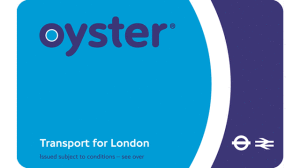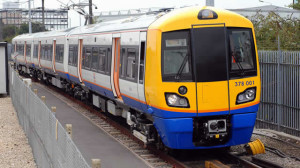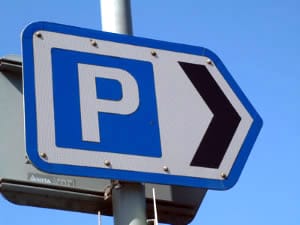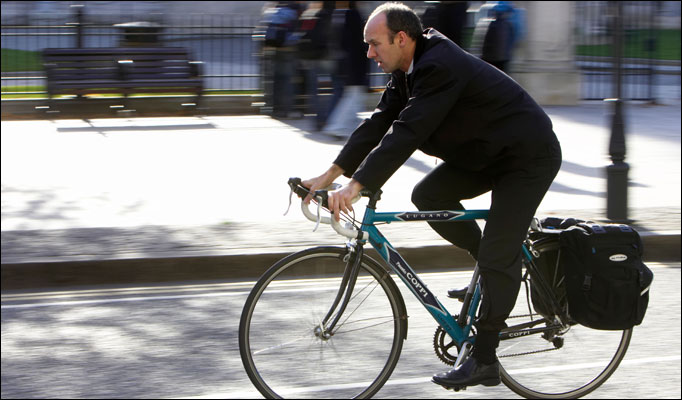Jasmine Birtles
Your money-making expert. Financial journalist, TV and radio personality.


It’s an unavoidable fact of life that we have to work. That means we also have to get to work, and the commute can eat up a fair whack of our hard-earned cash. But the key word there is ‘can’. In fact, there are ways to do it for less. Read on to learn how you could make a little change and end up with a big saving.
The key when it comes to buying train tickets is… make sure you buy the cheapest ticket. Simple.
 OK, it may sound silly, but you’d be amazed at how many people don’t do it. For example, did you know that two out of every three people could save money on train tickets with a railcard? Fares can often be up to a third cheaper than the full tariff!
OK, it may sound silly, but you’d be amazed at how many people don’t do it. For example, did you know that two out of every three people could save money on train tickets with a railcard? Fares can often be up to a third cheaper than the full tariff!
Also, look in a couple of different places for your ticket – National Rail and The Trainline are the main websites to check but also try ringing a call centre, as prices may vary online and over the phone.
The next piece of key advice is to make sure you buy the type of ticket you need. If possible, book ahead as it’s often cheaper to buy your rail ticket in advance. Similarly, find out the ‘peak hours’ – there’s no point paying a premium for an ‘anytime’ ticket when you only actually need an ‘off-peak’ one.

When it comes to Underground, trams and light railways, and if you live in London, the first point is to stress is be sure to get yourself an Oyster card. The majority of Londoners already have one and with good reason – the Oyster system will never charge you more than what you would have paid with a regular ticket and it’s usually considerably cheaper. You’ll start saving money instantly.
Season tickets
 Finally, if you want to save cash, it’s vital to check out how much you could save with a season ticket. So many people queue for their travel card weekly, but if you will be working in the same place for a month or even a year you can save up to a third with a longer season ticket. And this doesn’t just apply to the regular rail system, but is equally important if you commute using any of the UKs urban, tram, underground or light railway services. Take a look at the National Rail season ticket calculator on their website.
Finally, if you want to save cash, it’s vital to check out how much you could save with a season ticket. So many people queue for their travel card weekly, but if you will be working in the same place for a month or even a year you can save up to a third with a longer season ticket. And this doesn’t just apply to the regular rail system, but is equally important if you commute using any of the UKs urban, tram, underground or light railway services. Take a look at the National Rail season ticket calculator on their website.
And don’t be put off by the thought of making a four-figure one-off payment either. Many companies run schemes where they will purchase your yearly travel card, and you can pay back in monthly installments directly from your salary. Ask to see if your employer offers such a service and suggest they start one if they don’t. You could even negotiate the cost of travel into your contract when you start a new job. That’s especially true now, as some companies are increasingly open to schemes that will reduce car travel and will boost their green and eco-friendly credentials.
Special discounts
Driving is often the most convenient way to get to work, but it’s rarely the cheapest. However, if you live in a rural area then you may have no choice. So if it has to be the motor, here are a few tips.
Actually buying a car is a big expense. So why not go for a second-hand model? Shop around on sites like Auto Trader and Desperate Seller to find the best deal. Also, be sure to have your vehicle serviced properly as a small fault fixed quickly is likely to cost you much less than if you leave it and it turns into a big repair job.
What’s more, a properly-serviced car will run more efficiently, saving you significant money on petrol! To get the best deal for your service, compare prices from firms like ATS and Kwik Fit but don’t discount your local mechanic either – because they don’t have to comply with a nationwide pricing structure they may be able to do you a better deal.
When it comes to car insurance, there’s no beating about the bush – it’s a nightmare. Prices depend on personal circumstances and there are so many providers out there it can be bewildering. Read our car insurance guide which will take the confusion out of the process.
You’ll want to use a comparison service to get the best prices easily. We have our very own car insurance comparison service which compares all the major providers. It’s quick and easy to use, so check it out here.
Once you’ve got your quotes just go through this list of the main providers to make sure you’re not missing any. If they aren’t displayed on the comparison service, go directly to their site and get a quote. Here are a few to get you started:
A word to the wise: talking to an operator on the phone rather than just tapping at a computer may help you get a better deal. The advice, as always, is to shop around and make sure you read the small print!
Fuel
A difference of, say, 3p a litre between the price at different garages may not sound like much, but if you have a 40-litre tank and fill up once a week, that actually equates to a difference of over £60 a year – surely worth having in your pocket. A site like PetrolPrices will help you find the cheapest garages in your area, and remember to earn points on your loyalty card every time you fill up.
Parking
 Another big consideration for anyone who commutes by car has got to be parking. You may think that there’s nothing you can do to get round this one, but actually there is a cheaper alternative to the big, commercial multi-storeys. Try logging on to websites like Parklet and JustPark. These sites let you rent a parking space at the houses of people who live near your office; you could even earn some money by letting others park their cars at your place while you’re out!
Another big consideration for anyone who commutes by car has got to be parking. You may think that there’s nothing you can do to get round this one, but actually there is a cheaper alternative to the big, commercial multi-storeys. Try logging on to websites like Parklet and JustPark. These sites let you rent a parking space at the houses of people who live near your office; you could even earn some money by letting others park their cars at your place while you’re out!
Liftshare
If you have no option but to drive to work, have followed all this advice and find that your eyes still water every time you switch on the engine, there’s still no need to despair. Why not see if you can share a lift? Ask around the office to see if anyone else lives round your neck of the woods and then set it up between you. If no-one lives near to you (or at least no-one you want to share a car with!), sites like Carshare, Liftshare and National Carshare can put you in touch with others who can help.
Scooters
The last option for cash-strapped commuters is to try to downsize. And we don’t mean just to a smaller car – why not go for a scooter? Even a brand-new one from a top make like Vespa can cost as little as £2,500, while we also found Direct Bikes offering a brand-new scooter from just £499 including delivery! What’s more, insurance will be far less than with a car (obviously how much less depends on your circumstances).
Bus and coach travel is sometimes seen as quite an unfashionable option among some commuters, but many don’t realise how cheap it can be compared to the train. Say you need to travel from Paddington to Old Street in London – on the Tube it would cost £2.10 but the bus would be just £1.40 with your Oyster card.
 Undoubtedly the simplest, healthiest and most environmentally-friendly way to get to work is to go under your own steam. And the best thing is it doesn’t cost you a penny!
Undoubtedly the simplest, healthiest and most environmentally-friendly way to get to work is to go under your own steam. And the best thing is it doesn’t cost you a penny!
The NHS recommends everyone do at least 30 minutes of exercise five days per week. The average person should be able to walk at 3 mph, meaning if you walk one mile to work and one mile back each day that’s 40 minutes of exercise each day. You’re already ahead of the NHS-recommended minimum!
And don’t think you have to walk the whole way to work. If you work in London, for example, why not just get off the Tube or bus a stop early? Not only will you get some good exercise, it could save you money as your Tube or bus fare may be cheaper if you’re in a different travelcard zone It could also be quicker – TfL (Transport for London) says 109 journeys between central London Tube stations are actually faster on foot.
If it’s just too far to walk then going by bike has all the same health and environmental benefits as walking and still works out far cheaper than other forms of transport. Go to a retailer like Evans Cycles or look at online auction and classifieds sites like eBay, Amazon and Gumtree or even the police auction site Bumblebee Auctions to buy your bike and also get accessories like lights, a lock and a helmet. And that’s it, off you go!
What’s more, the government’s Cycle to work scheme can help you get a cheap bike and accessories as a tax-free benefit from your employer!
If you’re worried about your bike being swiped then see our article on bicycle insurance or go direct to a company like Endsleigh.

We’ve gone through a good load of possibilities here but they all have one thing in common: they’re designed change your commute. “Isn’t that the point of the article?” we hear you cry. Bear with us.
Instead of trying to change your commute, why not change your work? And we aren’t necessarily saying switch jobs (although if your commute’s REALLY bad, why not?). How about asking your boss to change your hours, for example? If you’re an early bird, why not see if you can start at, say, 7:30am and then leave at 3:30pm? If you aren’t wasting petrol sitting in rush-hour traffic jams then you’ll definitely save cash. Or you could avoid peak-hour fares on the railways by starting work at 10:30am and going through until 6:30pm. Try it out – if you don’t ask you don’t get!
Finally, if you want to be really radical, why not see if you can work from home? Clearly this option isn’t going to be work for everyone – we definitely wouldn’t recommend it if you’re a teacher – but for many office workers there’s no reason why this shouldn’t be possible, even if you need access to specific office software or network resources. Why not check out GoToMyPC? This site enables users to access all the files and programs on their workplace systems from anywhere in the world that has an internet connection.
 Whatever you decide to do to bring down those travel bills, it’s likely you might have to spend a little bit of money to start. If you do need to buy anything, from a scooter or moped to lights for your bike, there are some great shopping tips that you can always try to save just a little bit of extra cash.
Whatever you decide to do to bring down those travel bills, it’s likely you might have to spend a little bit of money to start. If you do need to buy anything, from a scooter or moped to lights for your bike, there are some great shopping tips that you can always try to save just a little bit of extra cash.

i have been mixing my commute by using my car, or public transport. It may not be the cheapest option but gives me freedom to not tide away with a contract and also get the comfort of my own car.
Working from home is a real possibility these days since WiFi and broadband, unlike when I started 10 years ago. I used to commute 50 miles to London and back every day on the train – sometimes it was great (good social gang meet up and lots of time for reading) and sometimes it wasn’t, but it was ALWAYS expensive. Once I had small children it became almost undoable, and so I started working from home, first part time and then full time, and it works for us: The kids are happier, I’m happier, we’ve more money, the housework gets… Read more »